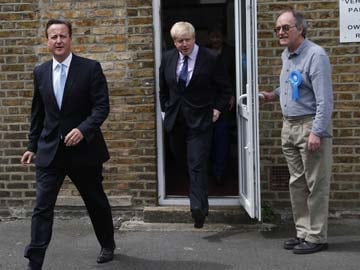
British Prime Minister David Cameron insisted on Monday he would not resign if Scotland votes to leave the United Kingdom. (File photo)
London:
British Prime Minister David Cameron insisted on Monday he would not resign if Scotland votes to leave the United Kingdom.
Cameron ruled out standing down as premier if voters in Scotland plump for independence in the September 18 referendum.
He maintained he was right to agree to the ballot, after the pro-independence Scottish National Party (SNP) of First Minister Alex Salmond won a clear majority in the devolved Edinburgh parliament three years ago and pledged to hold a referendum.
Asked directly if he would resign, Cameron told the BBC: "No, and I think it is very important people understand that, because it is not my name or anyone else's name on the ballot paper."
The union has existed since 1707 and Cameron has faced claims earlier in the campaign that his position could become untenable as the premier who lost it.
"Of course, I want to see Scotland stay in the United Kingdom but I faced a choice in 2011 when the Scottish nationalists were elected to run the Scottish government," Cameron said.
"Do you have a referendum, or do you have some massive fight with them, saying 'no, no, you can't possibly have this choice'?
"I remain of the view it was the right thing to do, was to give the Scottish people a fair, legal and decisive referendum. That's what will happen."
A spokesman for Salmond said that what Cameron would do in the event of a 'yes' vote for independence was up to him and the Conservatives.
In the meantime, he urged Cameron to accept a head-to-head debate with Salmond, "as he will find it very difficult to defend his position following a Yes vote if he has not come out to bat for his side".
Cameron refuses to enter such a debate, saying the battle is between the 'Yes' and 'No' campaigns within Scotland, rather than the British and Scottish premiers, as the SNP would have it.
The Financial Times newspaper's poll tracker - which compiles the last seven polls, excluding the maximum and minimum values - has the 'Yes' vote on 38 percent and 'No' on 47 percent.
The tracker shows the polls narrowing since January.
In the latest polls out Sunday, a Panelbase survey in The Sunday Times newspaper had 'Yes' on 40 percent and 'No' on 47 percent; an ICM poll in the Scotland on Sunday newspaper had 'Yes' on 34 percent and 'No' on 46 percent.
Cameron ruled out standing down as premier if voters in Scotland plump for independence in the September 18 referendum.
He maintained he was right to agree to the ballot, after the pro-independence Scottish National Party (SNP) of First Minister Alex Salmond won a clear majority in the devolved Edinburgh parliament three years ago and pledged to hold a referendum.
Asked directly if he would resign, Cameron told the BBC: "No, and I think it is very important people understand that, because it is not my name or anyone else's name on the ballot paper."
The union has existed since 1707 and Cameron has faced claims earlier in the campaign that his position could become untenable as the premier who lost it.
"Of course, I want to see Scotland stay in the United Kingdom but I faced a choice in 2011 when the Scottish nationalists were elected to run the Scottish government," Cameron said.
"Do you have a referendum, or do you have some massive fight with them, saying 'no, no, you can't possibly have this choice'?
"I remain of the view it was the right thing to do, was to give the Scottish people a fair, legal and decisive referendum. That's what will happen."
A spokesman for Salmond said that what Cameron would do in the event of a 'yes' vote for independence was up to him and the Conservatives.
In the meantime, he urged Cameron to accept a head-to-head debate with Salmond, "as he will find it very difficult to defend his position following a Yes vote if he has not come out to bat for his side".
Cameron refuses to enter such a debate, saying the battle is between the 'Yes' and 'No' campaigns within Scotland, rather than the British and Scottish premiers, as the SNP would have it.
The Financial Times newspaper's poll tracker - which compiles the last seven polls, excluding the maximum and minimum values - has the 'Yes' vote on 38 percent and 'No' on 47 percent.
The tracker shows the polls narrowing since January.
In the latest polls out Sunday, a Panelbase survey in The Sunday Times newspaper had 'Yes' on 40 percent and 'No' on 47 percent; an ICM poll in the Scotland on Sunday newspaper had 'Yes' on 34 percent and 'No' on 46 percent.
Track Latest News Live on NDTV.com and get news updates from India and around the world

